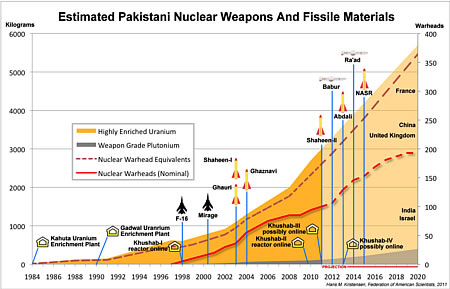 |
| Pakistan’s nuclear arsenal has doubled since 2004 and could double again in the next 10 years if the current trend continues, according to the latest Nuclear Notebook. Click on chart to download full size version. |
.
By Hans M. Kristensen and Robert S. Norris
The latest Nuclear Notebook on Pakistan’s nuclear forces is available on the Bulletin of the Atomic Scientists web site. Since our previous Notebook on Pakistan in 2009 there have been several important developments.
Based on our own estimates, official statements, and fissile material production estimates produced by the International Panel of Fissile Materials, we conclude that Pakistan’s current nuclear weapons stockpile of 90-110 warheads might increase to 150-200 within the next decade. This would bring the Pakistani stockpile within range of the British stockpile, the smallest of the original five nuclear weapon states, but still far from that of France (despite some recent news reports to the contrary).
This development is precipitated by the anticipated introduction of several new nuclear delivery systems over the next years, including cruise missiles and short-range ballistic missiles. The capabilities of these new systems will significantly change the composition and nature of Pakistan’s nuclear posture.
India is following this development closely and is also modernizing its nuclear arsenal and fissile material production capability. The growing size, diversity, and capabilities of the Pakistani and Indian nuclear postures challenge their pledge to only acquire a minimum deterrent. Bilateral arms control talks and international pressure are urgently needed to halt what is already the world’s fastest growing nuclear arms race.
This publication was made possible by a grant from Carnegie Corporation of New York and Ploughshares Fund. The statements made and views expressed are solely the responsibility of the author.
The FY2026 National Defense Authorization Act (NDAA) paints a picture of a Congress that is working to both protect and accelerate nuclear modernization programs while simultaneously lacking trust in the Pentagon and the Department of Energy to execute them.
While advanced Chinese language proficiency and cultural familiarity remain irreplaceable skills, they are neither necessary nor sufficient for successful open-source analysis on China’s nuclear forces.
Satellite imagery has long served as a tool for observing on-the-ground activity worldwide, and offers especially valuable insights into the operation, development, and physical features related to nuclear technology.
This report outlines a framework relying on “Cooperative Technical Means” for effective arms control verification based on remote sensing, avoiding on-site inspections but maintaining a level of transparency that allows for immediate detection of changes in nuclear posture or a significant build-up above agreed limits.